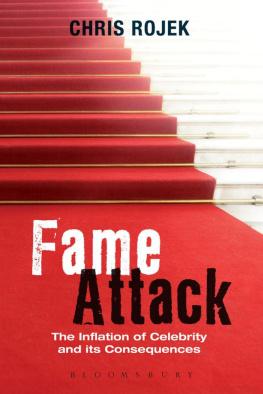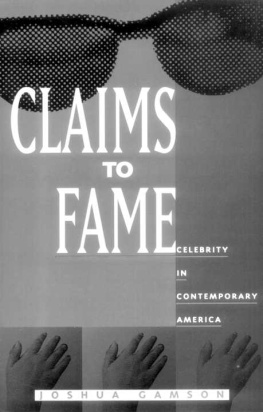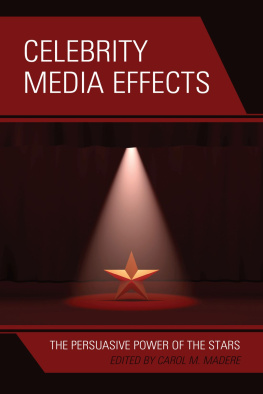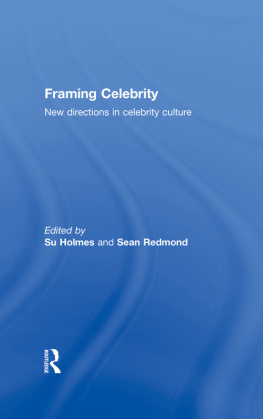First published in 2012 by
Bloomsbury Academic
an imprint of Bloomsbury Publishing Plc
50 Bedford Square, London WC1B 3DP, UK
and
175 Fifth Avenue, New York, NY 10010, USA
Copyright Chris Rojek 2012
All rights reserved. No part of this publication may be reproduced, stored in a retrieval system, or transmitted by any means, electronic, mechanical, photocopying or otherwise, without the prior written permission of the publisher.
No responsibility for loss caused to any individual or organization acting on or refraining from action as a result of the material in this publication can be accepted by Bloomsbury Academic or the author.
CIP records for this book are available from the British Library and the Library of Congress
ISBN 978-1-84966-071-6 (paperback)
ISBN 978-1-84966-072-3 (hardback)
ISBN 978-1-84966-804-0 (ebook PDF)
This book is produced using paper that is made from wood grown in managed, sustainable forests. It is natural, renewable and recyclable. The logging and manufacturing processes conform to the Environmental regulations of the country of origin.
Printed and bound in Great Britain by the MPG Books Group, Bodmin, Cornwall
Cover image Miramiska/Shutterstock
www.bloomsburyacademic.com
Contents
As for fame, consider ... that as one heap of sand thrown upon another covers the first, so it happens in life, a new glory soon eclipses an old one
Marcus Aurelius, Meditations
Who are the men, who, without our realizing it, give us ideas, tell us whom to admire and whom to despise, what to believe about ... how our houses should be designed, what furniture we should put into them, what menus we should serve at our table, what kind of shirts we must wear, what sports we should indulge in, what plays we should see, what charities we should support, what pictures we should admire, what slang we should affect, what jokes we should laugh at?
Edward Bernays
Stars are recorded people
John Castles
The quest for power is, as we have seen, a protection against helplessness and against insignificance. This latter function it shares with the quest for prestige. The neurotic that falls in this group develops a stringent need to impress others, to be admired and respected. He will have fantasies of impressing others with beauty or intelligence or with some outstanding accomplishment; he will spend money lavishly and conspicuously ... He will not be able to have anyone as a friend, husband, wife, employee, who does not admire him. His entire self-esteem rests on being admired, and shrinks to nothingness if he does not receive admiration
Karen Horney
Fame is not a normal state of affairs for the human being. It takes a lot of strength and a lot of patience and a tremendous amount of reality checks to live through something like being The Fonz [his character on Happy Days]. But if you get caught up in it, it will eventually cut you in half
Henry Winkler
Preface: The New Aristocracy of Fame
In the ancien rgime, unbowed insistence upon being judged by title in precedence to deeds was the downfall of monarchy. Charles I in England and Louis XIV in France were executed ultimately because public opinion ceased to accept their divine right to rule. Charles and Louis were ascribed celebrities. That is their fame and influence derived from bloodline and was supported by Court protocol and precedent. As industrialization and democracy began to take root, the principle of the divine right of kings started to be openly rejected.
The social, economic, cultural and political forces in question are complex. It is an oversimplification to propose that all vestiges of ascribed celebrity have been swept aside by the ascendant power of industry and democracy. The wedding of Prince William and Kate Middleton in 2011 dominated the global media and transfixed the public. But it should be recalled that it was a marriage between the heir to the throne and a commoner. Blue blood does not run in the veins of Kate Middleton. Her father worked as an airline steward, and later as a flight dispatcher, for British Airways, and her mother was an airline stewardess.
The marriage illustrates nicely the reframing of celebrity culture since the time of Charles I and Louis XIV. It is not just that people from ordinary backgrounds now have the chance to marry into royalty; rather it is that, if this occurs, they become media flypaper for stories, features, rumours, op-ed pieces, interviews and photo spreads. Their views may be no more substantial or insightful than any other offspring of airline handling staff. Nonetheless, they command the worlds headlines and gradually come to the conclusion that they have an entitlement to do so.
It might be thought that achieved celebrity is inherently positive. For it replaces an aristocratic order in which birthright is all, with a more open society in which rank ceases to be the primary metric of fame. Ascribed celebrities are famous for their reputations ; achieved celebrities are famous for their deeds . Oh happy land in which such a distribution of fame comes to pass! In fact, the age of achieved celebrity has produced a new aristocracy of fame. It consists of stars who are elevated on to the public horizon and who stay there not so much by virtue of their deeds, but by the power of the PR-Media hub behind them. Little has been written about the relationship of this power hub with celebrity culture. Yet the PR-Media hub is fundamental.
Long ago, in The Defence of Poetry (1821), Shelley claimed that poets are the unacknowledged legislators of the world. Now that privilege has transferred to features line staff, news producers, current affairs editors and TV presenters. The reality TV show impresarios Simon Fuller and Simon Cowell possess the power to present three-minute attractions that overshadow news about unrest in the Middle East, child poverty, hunger in Africa, irregularities in the banking system and youth drug addiction. They preside over a setting in the media that has become an idolatry funfair, spinning insubstantial idols today, only to cast them aside for similar plastic replacements tomorrow. Celebrities are the kings and queens of satellite and terrestrial soft news shows that give audiences headlines and sound bites instead of analysis (Baum, 2007; Castells, 2009: 328). While this is a source of disquiet in the serious media, it is not really an issue for students of popular culture. For it is how the majority of them get their news. News and stories of bona fi de achieved celebrities, who have acquired fame by virtue of their talents and accomplishments, are treated as equivalent to sound bites from contestants on Pop Idol and The X Factor or the latest reality TV shenanigans. For many of our fellow citizens, celebrity media news is the only news that matters. It is easy to dismiss these developments as insignificant and symptomatic of deeper problems in the culture. It is a mistake to do so.
Celebrity culture is functional. That is it has functions for the people that produce it and for the people that receive it. Celebrity images, writes Chris Hedges are reflections of our idealized selves sold back to us (Hedges, 2009: 48). In the age of ascribed celebrities, kings and queens presented themselves as the patriarchs and matriarchs of the people. One of the cardinal principles of monarchy was that the best that is in us is present a thousandfold in them. The new aristocracy of fame provides round-the-clock escapism and a light blusher of life-coaching that offer the comfort of distinction and the illusion of wisdom.
Next page






